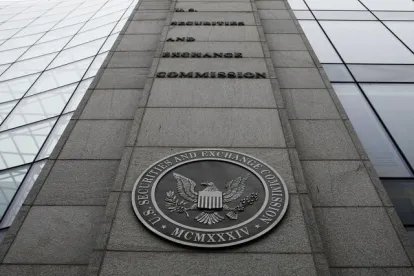During the previous quarter, the SEC proposed new rulemaking to reduce the number of smaller companies that become subject to enhanced reporting requirements through “accelerated filer” and “large accelerated filer” status. In addition, the US Supreme Court invalidated a widely accepted judicial test that required a showing of “substantial competitive harm” prior to excluding competitively sensitive information from public disclosure under FOIA. The SEC issued new interpretive guidance on its analysis of initial coin offerings and whether tokens issued in such offerings constitute securities. Finally, NASDAQ updated its definition of “family member” to more closely align its criteria for independent directors with the standard used by the New York Stock Exchange.
IN DEPTH
SEC Proposes Amendments to Accelerated and Large Accelerated Filer Definitions
On May 9, 2019, the US Securities and Exchange Commission (SEC) proposed amendments to the definitions for “accelerated filer” and “large accelerated filer” that would exclude from such definitions any company that is eligible for “smaller reporting company” (SRC) status under the SRC definition’s revenue test and raise the public float thresholds for exiting accelerated and large accelerated filer status. The proposed amendments would reduce the number of smaller public companies that qualify for accelerated filer and large accelerated filer status and thus reduce the number of companies subject to the reporting and compliance burdens associated with such status.
Specifically, the proposed amendments would exclude from both definitions of “accelerated filer” and “large accelerated filer” any company that qualifies for SRC status due to having annual revenues in its most recently completed fiscal year of less than $100 million. As discussed in our prior On the Subject, in 2018 the SEC expanded SRC eligibility by amending the SRC definition to apply the $100 million annual revenue threshold to all companies with a public float of less than $700 million. As a result of the amendments to the SRC definition, there was an overlap between companies that qualify for SRC status and those that qualify for accelerated filer status. Consequently, companies with $75 million or more of public float remained subject to the requirements that apply to accelerated filers despite qualifying for SRC status. The proposed amendments seek to reduce this area of overlap.
Further, under the accelerated filer and large accelerated filer definitions currently in effect, a company that has achieved accelerated filer or large accelerated filer status maintains such status unless (as of the last business day of the issuer’s most recently completed second fiscal quarter) its aggregate worldwide market value of the voting and non-voting common equity held by non-affiliates is less than $50 million and $500 million, respectively. The proposed amendments would increase the transition thresholds for accelerated and large accelerated filers becoming non-accelerated filers from $50 million to $60 million and for exiting large accelerated filer status from $500 million to $560 million. Under the proposed amendments, a company could also exit accelerated and large accelerated filer status if it again became eligible for SRC status under the revenue requirements.
In addition to complying with accelerated filing deadlines, accelerated and large accelerated filers are required to comply with Section 404(b) of the Sarbanes-Oxley Act of 2002 by providing an auditor’s attestation of management’s assessment of the effectiveness of internal control over financial reporting (ICFR). If enacted, the amendments would relieve certain smaller companies with low revenue from the burdens of complying with the auditor attestation requirements. However, such companies would continue to be required to establish and maintain ICFR and have management assess the effectiveness of its ICFR.
The public comment period for the proposed amendments ends on July 29, 2019.
SCOTUS Quashes ‘Substantial Competitive Harm’ Requirement for Obtaining Confidential Treatment
On June 24, 2019, the Supreme Court issued its decision in Food Marketing Institute v. Argus Leader Media, holding that the Freedom of Information Act (FOIA) exemption for commercial or financial information that is “confidential” does not require a showing that public disclosure of such information would cause “substantial competitive harm.” Instead, the Court held that an exemption from FOIA is available and appropriate “where commercial or financial information is both customarily and actually treated as private by its owner and provided to the government under an assurance of privacy.” The holding invalidated a key criterion used by many federal agencies, including the SEC, as a necessary condition to granting confidential treatment to information provided to such agency by the public.
Known as Exemption 4, FOIA’s mandate that federal agencies facilitate the public disclosure of government records of regulatory activity exempts “trade secrets and commercial or financial information” provided to the agency by the public that is “privileged or confidential.” In 1974, the D.C. Circuit, in National Parks & Conservation Association v. Morton, held that interested parties seeking to shield agency information from public disclosure in reliance on Exemption 4, must also show that disclosure of such information would cause “substantial competitive harm.” Various courts of appeals followed by adopting a similar test.
The “substantial competitive harm” test was adopted by the SEC through Staff Legal Bulletin No. 1 and it has long been a touchstone of the SEC staff’s review of requests seeking confidential treatment of business information that would otherwise be disclosed in filings made pursuant to the federal securities laws. In addition, the Court’s decision comes on the heels of the SEC’s first liberalization of the confidential treatment regime in decades. As discussed in our prior On the Subject, in March the SEC adopted amendments to Regulation S-K, rolling back strict procedures for obtaining confidential treatment for information contained in material agreements that are publicly filed. The amendments permit the omission of information, without the submission of a formal request, that is not material and for which public disclosure would likely cause competitive harm. The amendments also permit companies to omit schedules, exhibits or other attachments to material agreement exhibits if such attachments do not contain material information and the information therein was not otherwise disclosed.
Of note, the Court’s holding retains as a criteria of relief under Exemption 4 that the federal agency offer assurances to the owner of such information that it will be kept private. Because the information at issue in Food Marketing Institute met this criteria, the Court did not address circumstances under which information could retain its confidential character despite the government’s refusal to provide such assurances, such as when a request for confidential treatment is denied. This raises the question as to when, if at all, under the SEC’s public disclosure regime, the criteria for granting confidential treatment can be more restrictive than the criteria under Exemption 4. In light of this uncertainty and the SEC’s amendments to confidential treatment requests, Companies are encouraged to reassess their public disclosures, particularly with regard to information that is of a competitively sensitive nature.
SEC Issues Framework, No Action Letter Outlining ICO Securities Analysis
On April 3, 2019, the Strategic Hub for Innovation and Financial Technology (FinHub) of the SEC published informal guidance, titled “Framework for ‘Investment Contract’ Analysis of Digital Assets” (the Framework), which provides analytical tools and a list of factors for determining whether a blockchain asset is a security under the US federal securities laws. The factors included in the Framework are based on an analysis of whether the blockchain asset is an “investment contract,” as that term was first used by the Supreme Court in SEC v. Howey and has been further clarified through subsequent case law.
In addition, in connection with the release of the Framework, FinHub, through the SEC Division of Corporation Finance, issued a no action letter to TurnKey Jet, Inc. (TKJ) stating that it will not recommend any enforcement action against TKJ if it offers and sells its “tokenized” jet card, a blockchain asset that would likely be labeled a cryptocurrency, without registration under the federal securities laws. The no action letter is the first of its kind to analyze whether a blockchain asset is a security under the federal securities laws.
In the TKJ no action letter, FinHub referenced several of the new Framework factors, including that:
-
TKJ will not use any funds from its token sale to develop the its blockchain network, token platform or app, and each of these will be fully developed and operational at the time any TKJ Tokens are sold (in TKJ’s request for no action, TKJ stated that funds would be held in escrow until the TKJ Token is redeemed for air charter travel, at which time they will be disbursed to TKJ, or a participating broker or carrier);
-
The TKJ Tokens will be immediately usable for their intended functionality (purchasing air charter services) at the time they are sold;
-
TKJ will adopt technical and legal restrictions that will limit the transfer of TKJ Tokens to wallets within the TKJ platform only; and
-
TKJ will sell its tokens at a price of one US dollar per token throughout the life of the program, and each token will represent a TKJ obligation to supply air charter services at a value of one US dollar.
For additional commentary on the Framework and the TKJ no action letter, see our On the Subject.
Nasdaq Changes Definition of ‘Family Member’ in Director Independence
On June 12, 2019, Nasdaq filed a Notice of Filing of Proposed Rule Change to amend the definition of “family member” in Nasdaq Listing Rule 5605(a)(2) as such definition applies to the determination of whether a listed company director qualifies as an “independent director.” The rule change excludes from the definition of “family member” step children and domestic employees sharing a home with the director. The purpose of the amendment is to more closely align Nasdaq’s rule with the rule used by the New York Stock Exchange regarding the criteria to be applied by a company’s board when determining a director’s independence.
Subject to certain exceptions, Nasdaq Listing Rule 5605(a)(2) explicitly excludes from the definition of “independent director” any director who has a family member who:
-
Accepted any compensation from the listed company in excess of $120,000 during any period of 12 consecutive months within the three years preceding the determination of independence;
-
Is a partner in, or a controlling shareholder or an executive officer of, any organization to which the listed company made, or from which the listed company received, payments for property or services in the current or any of the past three fiscal years that exceed 5% of the recipient’s consolidated gross revenues for that year, or $200,000, whichever is more;
-
Is employed as an executive officer of another entity where at any time during the past three years any of the executive officers of the listed company served on the compensation committee of such other entity; or
-
Is a current partner of the listed company’s outside auditor, or was a partner or employee of the listed company’s outside auditor who worked on the listed company’s audit at any time during any of the past three years.
Nasdaq’s rules also preclude a director from being considered independent if such director is a family member of an individual who is, or at any time during the past three years was, employed by the company as an executive officer.
Prior to the rule change, “family member” included children “by marriage” and anyone residing in a director’s home. In issuing the proposed amendment, Nasdaq stated that it does not believe that in all circumstances a relationship between a director’s step child or a live-in domestic employee and the listed company should preclude a director from being considered independent. However, notwithstanding the proposed rule change, boards of Nasdaq-listed companies are to continue to affirmatively determine that no relationship (familial or otherwise) exists that would interfere with a director’s exercise of independent judgment while carrying out their responsibilities.
Pending any action taken by the SEC to disapprove the rule change, it will become effective on July 27, 2019.







 />i
/>i

